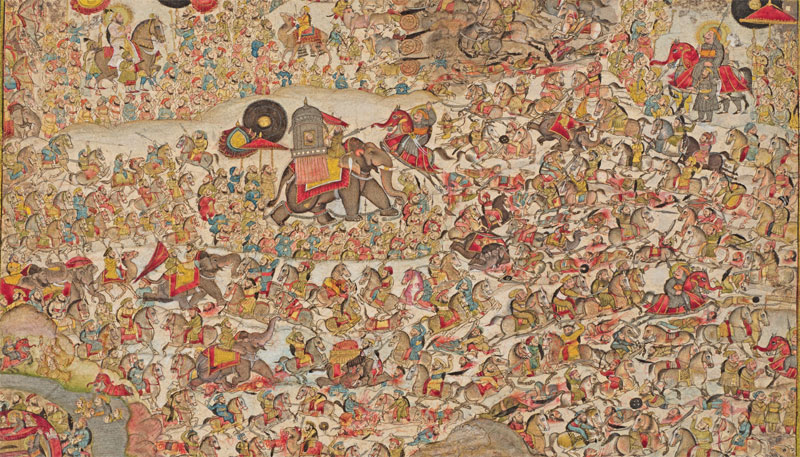Ahistorical imaginations of Indian history sustains the idea of ‘righting’ wrongs of the past
 Manimugdha S. Sharma
Manimugdha S. Sharma
For some time now, India’s Hindu right-wing has been raging about school and college textbooks glorifying invaders and not ‘our’ (read Hindu) kings. Mostly confined to alt-right blogs and social media platforms before 2014, this chatter has now reached mainstream media spaces where accusations fly thick and fast that Left-leaning historians deliberately wrote histories that made Indians feel ashamed of their past.
Through TV debates, op-eds, blogs, YouTube videos, Twitter threads, and Facebook posts, it is being increasingly underlined that India needs to mainstream a celebratory view of the past that privileges Hindu rulers over and above everyone else. History should instil pride in our past among our youth for Bharat to be true ‘vishwaguru’ in the future, they argue.
This is the core thought; it is possible to encounter it in various forms through different commentators: a right-wing author who loves to sermonise at literature festivals and TV debates about India having a ‘civilisational nationalism’ that goes back thousands of years, so history textbooks must accurately reflect this; a retired military officer whose hyper-nationalist rants come amid laments that our textbooks only show Muslims defeating Hindus; a right-wing journalist who talks about the need for a ‘truth and reconciliation commission’ like in some other post-colonial countries; or a social media influencer who claims that the British left India as they were scared of the Rashtriya Swayamsevak Sangh, but India’s historians, influenced by Marxist thought and Christian and Islamic evangelism, projected them as cowards and traitors.
It gets more and more bizarre if we start tracking every article, every tweet that talks about the need to rewrite Indian history. But all of this is couched in decolonisation rhetoric. We are told that our education and our minds need to be decolonised, and we need to look at our past as it truly existed and not how the Marxists ‘distorted’ it by being apologists for ‘Islamic’ invaders.

We are told that these invasions destroyed our culture, but academic historians, following a nefarious agenda, gave a positive spin to it and showed that this only enriched Indian civilisation. This view imagines a pristine parent culture that got corrupted, and it produces a longing to revive that lost glory.
This isn’t empty rhetoric; recent reports about NCERT changing its syllabi and dropping chapters on the Mughals, removing references to Dalit authors, the 2002 Gujarat pogrom, etc., suggest that even though Bollywood actor Akshay Kumar’s film Samrat Prithviraj tanked at the box office, his appeal for the changing of textbooks was heard by the highest authorities of the land.
Those in favour of these changes claim all this was colonial knowledge that Indians were brainwashed with; only now the real, hidden history of the glorious Hindu civilisation of India that is Bharat will be revealed.
History, therefore, is no longer an academic’s pursuit of the past or a general reader’s object of curiosity; it has been weaponised to suit the socio-political objectives of those who imagine an internal enemy on whose body the past must be avenged, and whose defeat and annihilation would birth a new homogenous present and future. This leads to othering, in this case of a whole community. And a way to defeat the other is by attacking his sacred spaces or sites of historical memory, as is evident from the numerous recent claims about mosques or Sufi shrines being originally Hindu temples that must be returned to their original owners—the majority community.
Sacred sites have played an important role in the Hindu nationalist construction of space. In this view, India is a sacred geography ritually constituted by Hindu pilgrimage networks—a ‘civilisational state’ that is timeless. Hindu-Muslim relations are seen through the dimension of conflict, so the period from the 13th century—when the Delhi Sultanate was established—until the end of British rule is seen as a dark period when the civilisational state was captured illegally by mlechhas (savages/outsiders) and Hindus were humiliated and reduced to slavery. This imagination is powered by a denial of history.
It denies that Hindus and Muslims co-existed, and most of the time amicably and peacefully. It denies that there was intermingling, which led to a cultural diversity that the founding fathers of the Indian republic wanted to be pursued as a national ideal. It even denies the existence of the nation-state of India which was founded in 1947—hence the claim that it is a timeless entity. This latter sentiment also manifests itself in the rejection of Mahatma Gandhi as the Father of the Nation.
This denial of history also produces a strange language of inclusion. Hindu nationalists want Indian history textbooks to focus more on the Vijayanagar Empire, the Cholas, the Ahoms, and so on—dynasties and kingdoms that get far less attention than the Mughals. In a televised debate over India’s history last year organised by a Noida-based news channel, the right-wing author referred to earlier claimed that ‘obscure dynasties which are bigoted’—and he gave the example of the Lodhis and Khiljis—get disproportionate attention in history books as opposed to the Vijayanagar Empire, the Cholas, the Ahoms, etc.
If judged superficially, this seems like a fair point. But it isn’t, for the justification that is provided for the importance of these kingdoms gives out the real motive. Why are the Ahoms important to the Hindu nationalists? Pat comes the answer: they defeated the Mughals ‘17 times’. So, the Ahom story is essentially, to the Hindu nationalist imagination, a triumphalist one in which a Hindu power, even if on the margins of India’s political geography, successfully stood up to a Muslim power. That the Ahoms fought the greatest number of wars with other Hindu kingdoms and carried out brutal massacres of Hindu subjects of those kingdoms without consideration isn’t mentioned at all.
Why are the Cholas important? We have an easy answer for that too: because they ‘colonised’ parts of South-East Asia and were instrumental in the ‘spread of Hinduism’ in foreign lands. They built grand temples across their empire, which ‘surpassed’ the buildings of the later-day Mughals in scale and scope. That their empire was the result of bloody conquests and subjugation of peoples and involved temple desecrations—something Hindu nationalists are very sensitive about as long as it is done by Muslims—is never mentioned.
You must be logged in to view this content.

